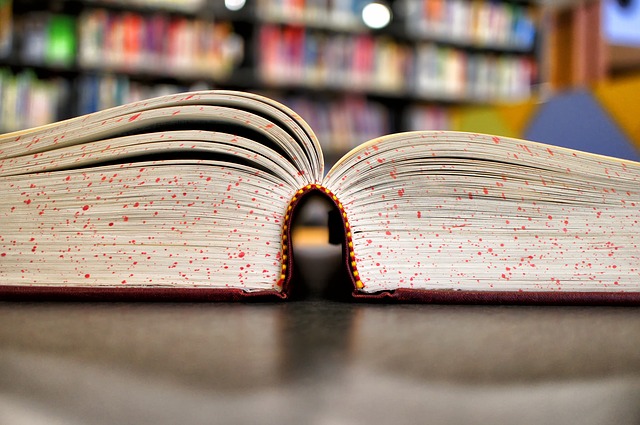The Pleasures Of Reading

By Sunehra Mehmood
Reading has the power to change the world around us. You may be sitting under the palms in the sweltering Karachi heat reading a book and suddenly you find yourself shivering in the coldest and filthiest part of a prison in Siberia. Alternately, you may be wielding a wand and fighting to death a dragon, the largest you can ever imagine; chasing after a rabbit; cross-dressing to escape your enemies; or having a terrifying encounter with an escaped convict in a churchyard. Additionally, considering how your tastes run, you may be conspiring to kill Julius Caesar or you may be preparing to vanquish your enemies at the battlefront.
Those who regard reading as a solitary occupation cannot be further from the truth. Books toss us unceremoniously on both seen and unseen locations, populated by people that one can’t help but like, loathe, pity or befriend. It involves crying at a friend’s misfortunes, laughing at the antics of a well-loved nephew, praying for the safe return of a beloved, mourning the loss of a child, or taking a walk with the star-crossed lovers. And, ultimately, becoming so engrossed in how the characters fare, faithfully seeing them to the very end.
Reading may well be a means of increasing one’s vocabulary and knowledge, but surely all this pales in comparison to the pure pleasure derived by that class of a reader, who delights in the interaction between the characters, the twists in the plot, and the author’s play on words. He interprets those words in his own way, imagining the scene and characters so painstakingly sewn together by the author, taking from it what he wills. The pleasure one experiences is not only immediate but it lingers long after the book is finished and can be relived again and again, anytime and anywhere. Beware though, for woolgathering in public with a little smile on one’s face is a natural side-effect of reading and may contribute excessively to one appearing a trifle dim-witted.
A reader, though, should not be discouraged by that eventuality, for reading can provide companionship when everyone else shuns you. Books will not judge you by the size of the pimple on your face or by the kind of phone you possess, nor will they care what time of the day you seek their society and they will certainly not reproach you when you return to them after months of neglect. However, no two book readers may have the same tastes. Fortunately, there are books in abundance for the delectation of every reader.
Readers who are fond of literary works claim that literature is the mirror of life as it showcases characters and scenes handpicked from the common-place aspects of everyday life, but with the author’s peculiar spin on it. Literature amuses us; forces us to move away from the literal words and melt into the picture that forms in the mind’s eye; introduces us to characters we vouch we have met in real life; and engages our emotions willy-nilly.
The quintessential quality of Poetry is its ability to say a lot in a very few words. It eloquently describes emotions and scenes that we, mere tongue-tied mortals, have felt and seen but have scarce been able to give words to. But far more fascinating is its ability to immerse us in a sea of emotions that we have never felt before. It can inspire and infuriate us, amuse and horrify us. It can relate horrors like wars and plagues and, in turn, use the words to advantage in describing such trivialities as a woman’s hair or eyebrow.
History, arguably, may seem dull to some, but not to those of us, including the writer, whose fate it is to be regarded terminally uncool. Readers of boring books about men and women, who have long been a feast for the insects, find joy in discovering about how people lived in the bygone ages. What they wore? What they ate? What kind of houses they lived in? Were they at all like us? Reading about the inhabitants of the past brings us closer to understanding the idiosyncrasies of the human mind, and also, closer to understanding the causes and effects of certain major events like wars. These books acquaint us with what was and gives us a better understanding of what is.
There are some who love reading books about politics. These books keep readers apprized of the happenings in the world; not, as some might suspect, so they can boast of their knowledge to their long-suffering friends. Au contraire, they have a genuine interest in the world at large, in how different forms of government work and what political decisions have beckoned ruin or, conversely, delivered the multitude from disasters of human formation.
Other admirers of books love to read biographies and memoirs of people who have left an indelible mark in this world. Such readers are exceedingly interested in the little details of the lives of important people and how they mastered adversity and stepped ahead in the world. And that’s not all. Readers may also wish to know, one conjectures, whether these people, at some point in their lives, had ever been so humbled as to have had failed an exam, or had been victim of the caprice of the object of their heart’s desire, or whether they had ever been told by their superior that they would never amount to anything.
Those of a spiritual turn of mind find solace in reading religious texts by spiritual leaders.These books provide balm for the wretched souls seeking tranquility, convince them that they can find forgiveness for their sins, remind them that they are not alone, and satisfy those yearning for closeness to God. But perhaps most significantly, these books teach them to forgive, not only others, but also themselves.
Mystery thrillers, crime, and spy novels are read by those who are desirous of adventure and excitement in their otherwise placid existence. These readers prefer suspense novels because they are at the mercy of their insatiable curiosity. Or, perhaps, they may simply be suffering from the hero syndrome but are unable to do anything about it due to their steady nine-to-fives. In any case, they opt to live vicariously through these novels.
These ‘whodunits’ take us into a world where people are not above murdering their kith and kin, where flying bullets almost never hit the hero, where car chases end up in a waste of gas for the villain, and secret files are the basis of the whole plot. These books give a crash course on revenge and intrigue, greed and power, corruption and double games. And, typically, result in the triumph of good over evil which, more often than not, translates into American or British victory over either the Germans, the Russians or, as of late, the Taliban.
Now then, lets move on to a more pleasant and less bloody genre known widely as romance. Books containing the affairs of the heart are viewed with derision by those who prefer serious reading. Nevertheless, not all romance novels are trash for they do teach us to believe in the basic goodness in people, no matter how much we may protest to the contrary considering our own real-life encounters with those answering to the description of the mother-in-law. Among the salient features of this genre is its ability to contrive, without fail, an end to all the animosity and misunderstandings. Love, we are told amidst bouts of prodigious weeping, is a cure for all the numerous aches and ills, and is capable of changing the otherwise villainous hearts and souls that had been pestering the hero and his inamorata from page one. These books show a wealth of human emotions, such as, jealousy, hatred, anguish and others of the unpardonably sappy variety. They strive to educate us about the difference between love and lust; to distinguish between beauty of form and beauty of heart; teaches the faint of heart to rebel against societal constraints; and lauds those who follow where their hearts lead them. After all this philosophizing, one hopes that the critics of this genre must have been convinced that romance novels are not just for aging spinsters who are trying to placate the lack of love and passion in their lives.
Humorous books are for those who delight in the ridiculous. These books offer a lighter side to life, refusing to spare even such sobering events as deaths, disasters and tragedies; and succeed admirably in brightening up the depiction of thoroughly mundane scenes such as a visit to the market-place or a tea-party. The perusal of such books offers a chance to the otherwise repressed reader to vent his natural inclination to laugh at other people, which had heretofore been strictly curbed by long-standing deference to societal norms. Others of the more morose disposition should try it too for it lifts up the spirits and makes us view our own situations wholly in a different light. Hence, an anecdote is a great antidote for those finding themselves habitually in the doldrums.
Books catering to the fancifully inclined encompass genres such as science-fiction, horror, magic, vampire/werewolvesand the like. Theyare read by thosewho have an overly active imagination and who wish and pray that a sparkly hundred-plus vampire would lovingly stalk them. Let it be known, lest the writer be bombarded with accusations of disparaging these genres that these books single-handedly shoulder the burden of appeasing the readers’ craving for the bizarre. Evidently, books consisting of everyday settings and characters would not do, but must contain people with appearances that are hard to fathom, and with names that are even more difficult to pronounce, but are, at the same time, extremely relatable. Indeed, no matter how weird they may appear, they still labor under the same old themes, namely, the perpetual tussle between good and evil, the importance of family and friends, the struggle to come to terms with death, and, of course, the discomforts of teen life, among others.
There are benefits aplenty of reading books which must be of considerable interest to those who read, not for the pure enjoyment of it, but for various other less important reasons. Reading is essential for acquiring knowledge and information, the natural outcome of which is an improvement in one’s quality of conversations. So if you are someone who likes to brag about their knowledge, in addition to being quite fond of dropping quotations and author names indiscriminately to the detriment of your listeners, then reading should prove quite effective in tooting your own horn. Further, reading sharpens our analytical thinking skills, so it should be a perfect pastime for the big sporting types. It also improves focus and concentration, advantageous for those suffering from social media addiction. Moreover, books provide escapism. As such, people constantly mired in worries should definitely try reading because books escort us to another land, another world, where we exchange our worries for the ones plaguing the characters. So they should feel right at home.
Reading books may be considered a sign of culture and sophistication, so if your true purpose is to show off, then you just need to carry a book with you, making sure to wave it around for maximum exposure. That should suffice, for there is no need to actually read it then. A real lover of books, on the other hand, does not look for such distinction for he reads for the pleasure of it, not to court society’s approval. Even after reading all this, if the casual reader remains indifferent to the charms of reading, then the writer accepts all responsibility for failing to effect a smooth transition, from thoughts to words, of the sensations experienced while reading a book or anticipating the reading of it.
Sunehra Mehmood is a freelance writer who blogs at sunehram.blogspot.com





